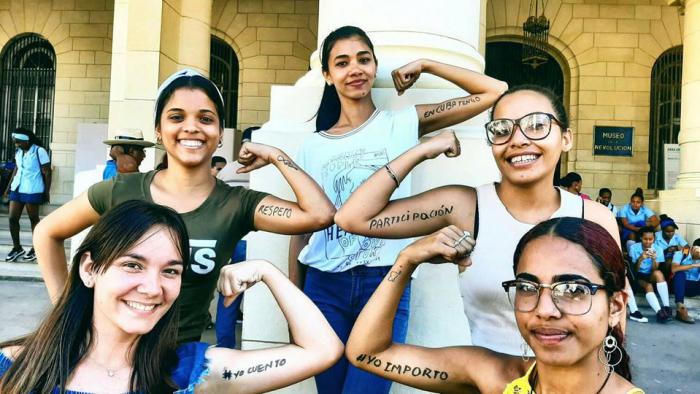

FROM THE LEFT
Why are There No Social Outbursts in Cuba?
Despite the intense propaganda to which the US allocates tens of millions of dollars each year, the results are overwhelmingly favorable to the revolutionary leadership that Washington has been trying to overthrow for six decades
Author: Iroel Sánchez | internet@granma.cu
November 2, 2020 02:11:30
Translated and edited by Walter Lippmann for CubaNews.

Young people
Photo: Taken from Karla Santana’s Facebook profile
A Brazilian friend who, as a journalist, was in Cuba for a few days, told me of her amazement at how all the Cubans she spoke to know who Bolsonaro is, who Dilma is and who Lula is, which was not the case in other Latin American countries she had visited recently.
The exceptional interest with which Cubans follow international events is something very particular that often goes unnoticed by those of us who live on the island. The social upheavals in Haiti, Chile, Panama and Ecuador, the conflict of powers in Peru, the endless repressions and assassinations of social leaders in Honduras and Colombia, the inherited ungovernability that forced the Mexican government to release a drug trafficker, the unjust imprisonment suffered by the leader of the Brazilian left to prevent his safe electoral victory and the elections in Bolivia and the United States, or Washington’s constant aggressions against Venezuela, can be topics of conversation anywhere in Cuba, from a corner where dominoes are played to a university classroom.
Of course, these conversations do not avoid the serious difficulties that the Cuban economy is going through, against which every week new US government sanctions are announced, nor any of the deficiencies in services with which the citizenry clashes. In these, the impact of the economic blockade can be mixed with bureaucratic laziness and cause discomfort and dissatisfaction.
However, this mixture of economic warfare with internal shortcomings does not cause social upheavals, and when the system – single-party socialism – has been put to the test at the ballot box, as in the recent constitutional referendum. This is so, despite the intense propaganda to which the US spends tens of millions of dollars each year and a well-funded “Cuba Internet Task Force”. The results have been overwhelmingly favorable to the revolutionary leadership that Washington has been trying to overthrow for six decades.
The explanation for the dominant media machine is that the mix of “intense regime repression” and “Cuban relaxation” prevents an outbreak. But in the history of Cuba –from Weyler’s reconcentration to Machado’s dictatorship to Batista’s– no regime based on repression has ever managed to remain in charge of the country for a long time, despite a “relaxation” in which corruption was the dynamic of the functioning of politics and the economy at all levels.
On the contrary, if instead of February 2019, the electoral consultation were to take place now, in the midst of an intensified blockade, the percentage of approval would probably exceed that obtained then, and that would be the result, without a doubt, of the combination of three conjunctural and two structural factors.
Conjunctural factors:
-
The intensification of the U.S. government’s aggressiveness strengthens patriotic sentiment and national unity.
The political effectiveness of the Cuban government, convincingly explaining the relationship of shortages with the increase in aggression, and the way in which the strategy to confront the US sanctions seeks to lessen their impact on the daily life of the people.
-
The international situation with visible failure of neo-liberal policies and discrediting of the formulas of bourgeois democracy
Structural:
-
The massive political culture among Cubans, established for 60 years by Fidel Castro’s teaching, about the nature of imperialism and the project of social justice and national sovereignty of the Revolution.
-
The link between the revolutionary leadership and the people, continued by the leadership of Raúl and supported by Díaz-Canel, which has reinforced the perception that the government listens to the people and works for them.
-
No Latin American country, of those who right now repress social protest with gunshots and gases and/or openly violate the rules of formal democracy that they themselves defend, has been subjected to economic warfare, to multi-million dollar financing to create an artificial opposition and, much less, to permanent global media and academic lynching of their leaders and their political and social project.
But in spite of all that, it must be recognized that there are dissatisfied people in Cuba, and many of those dissatisfied people are going to Miami. The accumulation of almost six decades of migratory privileges, together with the development of educational capabilities and the state of health brought about by Cuban socialism, make them very competitive with respect to the rest of the non-native communities, but they do not make them freer. More than one million Cubans in the US suffer serious limitations in their relations with their families in Cuba thanks to Trump’s measures; however, there is no news that this causes significant protests there.
Nor do we read anywhere that this public absence of disagreement is attributed to corruption and the repressive practices, not at all democratic, that the ruling class on the island until 1959 seems to have implanted in Miami during its already long stay in that city. This is not to disregard the uplifting example offered by a system that today puts Donald Trump and Joe Biden in competition, in corruption and insults.

You must be logged in to post a comment.